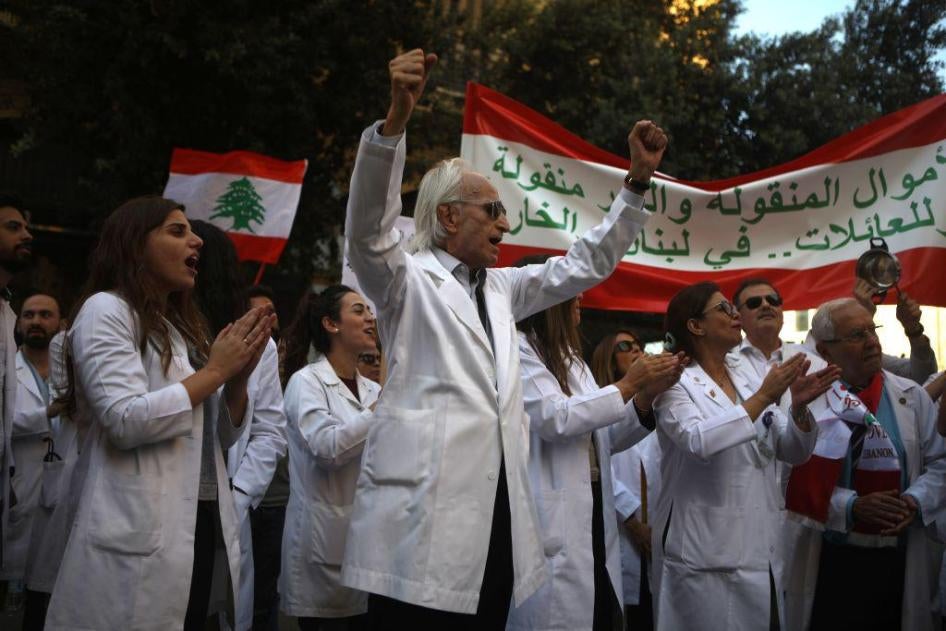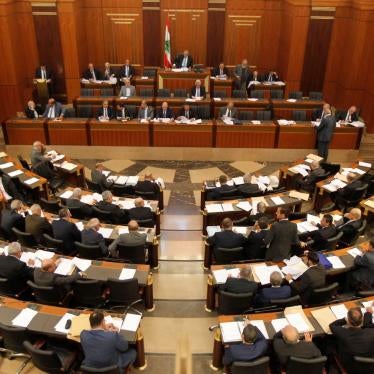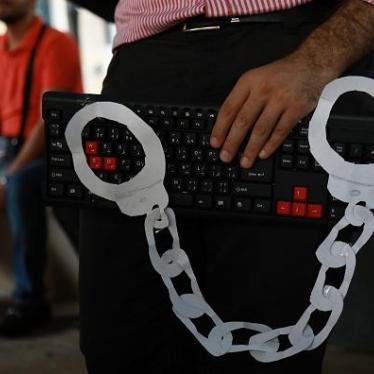(Beirut) – Lebanon’s medical practitioners and public officials are warning that hospitals may soon not be able to provide patients with life-saving surgery and urgent medical care because of a financial crisis, Human Rights Watch said today.
The crisis stems from the government’s failure to reimburse private and public hospitals, including funds owed by the National Social Security Fund and military health funds, making it difficult to pay staff and purchase medical supplies. In addition, a dollar shortage has restricted the import of vital goods and led banks to curtail credit lines.
“The Lebanese government’s failure to pay its bills to medical facilities seriously endangers the health of the population,” said Joe Stork, deputy Middle East director at Human Rights Watch. “While politicians horse-trade over a new cabinet, the government is not responding to the desperate economic situation in the country and the clock is ticking on the ability of many doctors and hospitals to treat patients.”
Sleiman Haroun, the head of the Syndicate of Private Hospitals, told Human Rights Watch that the Finance Ministry has not paid private hospitals an estimated US$1.3 billion in dues since 2011, compromising their ability to buy vital medicines and medical supplies and to pay staff salaries. The ministry disbursed most of the funds owed up until 2017, Haroun said, but private hospitals received only half of what was owed them in 2018 and not a single payment in 2019.
Private hospitals account for 82 percent of Lebanon’s healthcare capacity. Public hospitals also have not been receiving payments from the government. Officials at the Rafik Hariri University Hospital in Beirut and the Hermel Public Hospital in the Bekaa Valley told Human Rights Watch that the government has not made any payments in 2019.
Medical suppliers who provide equipment for both public and private hospitals said that they have not been able to import medical equipment since September due to the shortage of dollars and the absence of government regulations that would prevent banks from arbitrarily restricting money transfers outside the country.
On November 16, private hospitals carried out an unprecedented “warning strike” to sound the alarm about the shortages they were facing and to urge government officials to pay their arrears. The head of the Order of Nurses, Mirna Doumit, told Human Rights Watch that nurses are threatening an open-ended strike if private and public hospitals continue to delay payment of salaries or cut salaries in half, as some hospitals had warned they would have to do. The Finance Ministry should urgently disburse the funds owed to hospitals, Human Rights Watch said.
Medical supply importers are reporting difficulties bringing medical equipment into the country due to the shortage of dollars that they say began in July but was exacerbated in November, as well as the resulting unofficial devaluation of the Lebanese pound.
“If [this crisis] isn’t resolved, people will go into the hospital and die inside,” Salma Assi, a spokesperson for medical equipment importers, told Human Rights Watch.
On November 26, the caretaker health minister, Jamil Jabak, warned of “a major lack of supplies and equipment, and if this continues, we could reach a very dangerous situation.” Haroun told Human Rights Watch that medical equipment shortages are “causing many problems in surgeries. If we need a certain size of stent and we don’t have it, we are having to use a different size, and this causes complications in the surgery.”
On November 26, the Central Bank issued a decision guaranteeing 50 percent of the dollars medical suppliers need for imports at the official rate, leaving them to obtain the remaining 50 percent at the market rate. Assi noted that the guarantee did not include new equipment or even spare parts: “Ok I understand excluding new equipment. No one is going to start new investments. But spare parts? If I have a ventilator or an MRI machine, and something breaks, what will the hospital do?” She said that medical importers categorically rejected this proposal.
Medical supply importers stated that even if they did have the remaining 50 percent of the dollars in their bank accounts, banks were refusing to allow them to transfer those dollars to manufacturers abroad.
The government should make every effort to use the resources at its disposal to meet its minimum obligations under international law and reverse the erosion of Lebanese peoples’ access to adequate health services, Human Rights Watch said.
The Central Bank should issue clear and transparent regulations on cash withdrawals and money transfers to protect depositors and ensure that those are being applied fairly by all banks. The Central Bank should also develop clear and cohesive regulations for businesses, especially importers of vital goods, to ensure that they are able to continue operations.
The next prime minister should establish a committee consisting of relevant stakeholders, including representatives from the Central Bank, Finance Ministry, Health Ministry, private and public hospitals, and medicine and medical equipment importers to develop responsible fiscal policies to meet the challenges that the economic crisis has posed to access to medical care, medicine, and medical equipment.
“Lebanon should ensure that the right to health and access to medicines, to surgical supplies, and care is protected,” Stork said. “People risk dying in hospitals unless the government ensures that hospitals have access to necessary medicines and medical supplies.”
The Dollar Shortage
Lebanon’s economy has long depended on a regular inflow of US dollars, and the Central Bank has pegged the Lebanese pound to the US dollar at an official exchange rate of 1507.5 Lebanese pounds since 1997. Over the last 10 years, as economic growth slowed and remittances from the Lebanese diaspora have decreased, the quantity of dollars in circulation has declined. An increasing lack of confidence in the stability of the Lebanese pound in 2019 and concerns about the stability of the banking sector led depositors to withdraw from dollar accounts, making dollars increasingly scarce and causing the unofficial exchange rate to reach more than 2,200 Lebanese pounds to the dollar at the end of November.
A spokesperson for medical equipment importers, Salma Assi, told Human Rights Watch that Lebanon imports 100 percent of needed medical supplies. Suppliers must pay for imports in dollars, but receive hospital payments in Lebanese pounds. Around July, Assi said, medical importers started facing problems exchanging Lebanese pounds to dollars at banks due to the dollar shortage, and resorted to converting to dollars at private exchange brokers at rates higher than the official rate, losing significant sums in the process. However, they could not increase the price of the supplies, as those are priced in Lebanese pounds at rates set by the Health Ministry.
Assi said:
If [this crisis] isn’t resolved, people will go into the hospital and die inside. People on dialysis they get two sessions instead of three, do you know what this means? Their bodies are slowly getting poisoned. Do you know what it means not to have blood bags? … What will we do? Bring blood in a water bottle?
On November 24, medical equipment importers released a joint statement asking the Central Bank to guarantee 85 percent of the dollars the importers needed at the official exchange rate. The Central Bank in October had decided to do this for medicine, wheat, and fuel. The importers stated that they had started running out of some medical supplies, including bone screws, heart stents, dialysis filters, blood bags, medical gases, and spare parts, saying that remaining stocks would be depleted in a matter of weeks.
Although the Central Bank issued a decision on November 26 guaranteeing 50 percent of the dollars medical suppliers need for imports at the official rate, medical supply importers still reported trouble obtaining the remaining 50 percent.
Absent formal capital controls by the Central Bank, banks have set their own policies restricting depositors’ access to funds in their current dollar accounts and the transfer of money abroad, making it harder to import medical equipment and medicine. In a statement on December 3, medical supply importers stated that banks were refusing to allow them to transfer dollars already in their accounts to manufacturers abroad. Karim Gebera, the head Pharmaceutical Importers and Wholesalers Association, told Human Rights Watch that some banks were also not allowing medicine importers to transfer dollars already in their accounts to producers abroad.
Lebanese banks have also imposed severe restrictions on lines of credit, and foreign suppliers are now demanding full payment prior to delivery due to the refusal of insurance companies to cover shipments to Lebanon. Gebera said that Lebanon imports over 90 percent of the medicine it consumes. He said that medicine importers are facing a liquidity crisis as they are no longer able to take out lines of credit to cover their imports, and hospitals are unable to pay for medicine up-front. On December 3, medical importers warned that if hospitals cannot pay them in a timely manner, they will be forced to stop supplying them. Haroun, the head of the Syndicate of Private Hospitals, told local media that private hospitals are struggling to obtain necessary medicines, as “medicine importers are imposing conditions on hospitals regarding payments.”
International Obligations
Lebanon is a party to the International Covenant on Economic, Social and Cultural Rights (ICESCR), which requires it to take steps to achieve “the right of everyone to the enjoyment of the highest attainable standard of physical and mental health.” Under the covenant, states parties must ensure “[t]he creation of conditions which would assure to all medical service and medical attention in the event of sickness.” According to the UN Committee on Economic, Social and Cultural Rights, the international expert body that monitors implementation of the ICESCR, this includes,
the provision of equal and timely access to basic preventive, curative, rehabilitative health services and health education; regular screening programmes; appropriate treatment of prevalent diseases, illnesses, injuries and disabilities, preferably at community level; the provision of essential drugs; and appropriate mental health treatment and care.
The right to health includes access to “timely and appropriate health care” and “(f)unctioning public health and health-care facilities, goods and services, as well as programmes, have to be available in sufficient quantity within the State party.” Any state “which is unwilling to use the maximum of its available resources for the realization of the right to health is in violation of its obligations” under Article 12 of the Covenant.
Although the Covenant recognizes that constraints due to the availability of resources and the right to health is subject to progressive realization, the committee has held that it also imposes on states obligations which are of immediate effect, including an obligation to take steps towards the full realization of the rights to health. Such steps must be deliberate, concrete, and targeted toward the full realization of the right. Under the Covenant, states are required to adopt appropriate “legislative, administrative, budgetary, judicial, promotional and other measures towards the full realization of the right to health.” States should also ensure that progress towards ensuring the right to health does not regress – e.g. that people are denied essential medicine that they previously had access to.
A state’s failure to take all necessary measures to safeguard persons within their jurisdiction from infringements of the right to health by third parties, and the failure to regulate the activities of individuals, groups, or corporations so as to prevent them from violating the right to health of others, also constitutes a violation.









